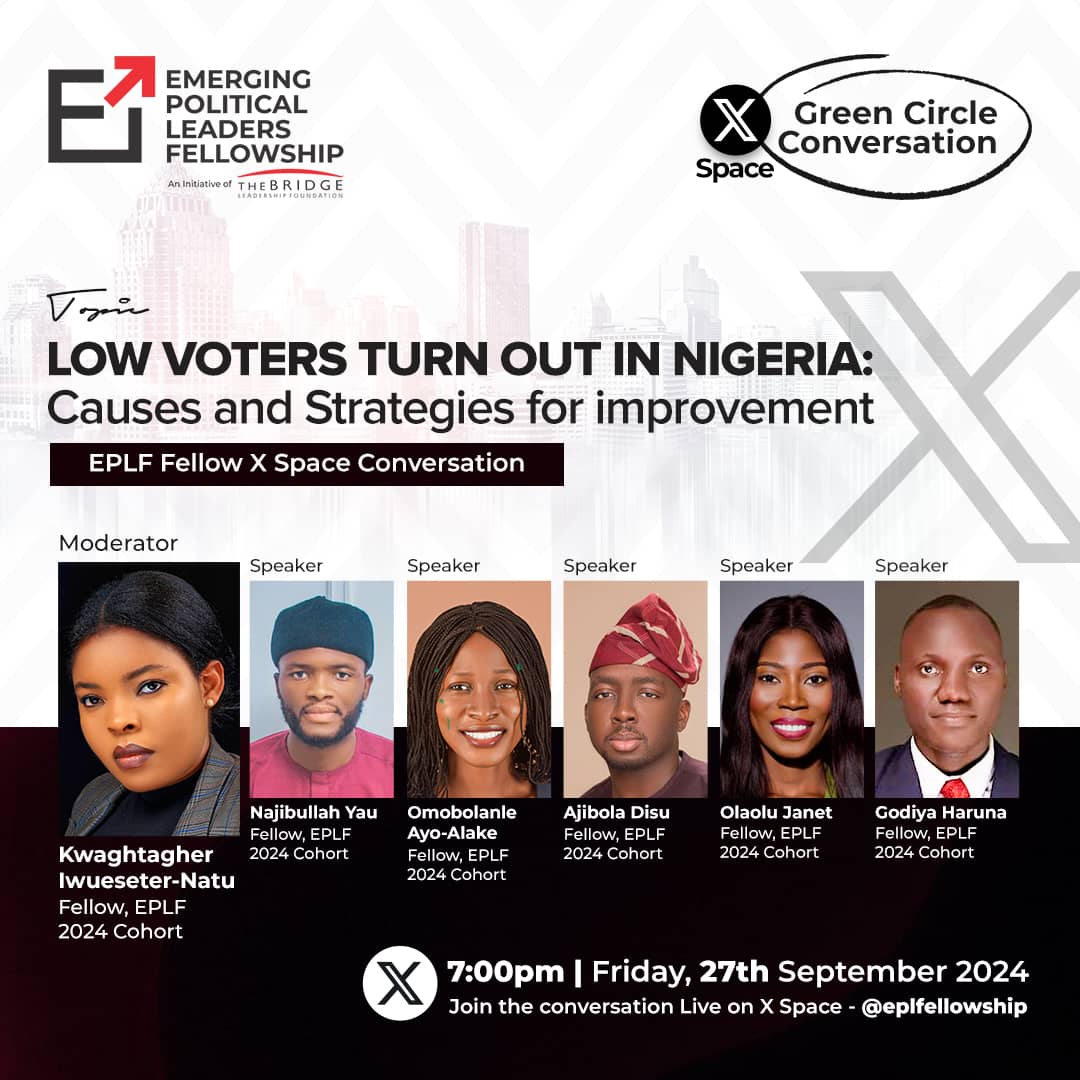On September 27, 2024, our fellows convened for a Green Circle Conversation, addressing the critical issue of low voter turnout in Nigeria. The objective was to analyze the root causes of this challenge and propose actionable solutions. We recognize that low voter turnout undermines the democratic process and weakens the legitimacy of elected officials. To foster an in-depth conversation, we posed several thought-provoking questions to our fellows, focusing on key factors influencing voter engagement in Nigeria.
The session was moderated by Kwaghtagher Iwueseter-Natu, with contributions from the following 2024 Cohort fellows: Najibullah Yau, Ajibola Disu, Omobolanle Ayo-Alake, Olaolu Janet, and Godiya Haruna.
How effective is democracy as a tool for leadership in Nigeria, and is it meeting the developmental needs of the Nigerian people?
Najibullah highlighted that the 2015 General Elections marked a significant decline in Nigeria’s electoral process. Many voters became disillusioned, feeling that each successive leader failed to meet their expectations. This growing distrust has diminished confidence in democracy as a tool for both leadership and national development.
Why is voter registration and turnout crucial to strengthening Nigeria’s democracy, and what impact does voter participation have on governance?
Omobolanle emphasized that active voter participation is the cornerstone of a healthy democracy. It ensures accountability, public trust, and electoral integrity. Without sufficient voter engagement, citizens lose their power to hold leaders accountable, thereby compromising the legitimacy of elected officials.
What are the primary causes of voter apathy in Nigeria, and how do these factors undermine the democratic process?
Ajibola pointed out that poverty, lack of awareness, and misunderstanding of elected officials’ roles are major drivers of voter apathy. In a context where voter turnout is low, it becomes easier to manipulate election results, threatening the integrity of the democratic process.
How do inadequate infrastructure and logistical challenges impact voter turnout, and what specific barriers prevent citizens from voting?
Janet explained that Nigeria’s outdated electoral system, combined with limited access to polling units and doubts about the fairness of vote counts, deters many from voting. Civil society’s voter education efforts are commendable, but systemic issues continue to hinder greater participation.
In what ways might Nigeria’s electoral laws and policies contribute to low voter turnout, and are there legal reforms that could encourage greater participation?
Godiya noted that restrictive policies, such as the mandatory use of Permanent Voter Cards (PVCs), and the lack of consequences for electoral offenses, contribute to voter apathy. Legal reforms are needed to simplify the voting process and restore public trust in the system.
Key Insights and Recommendations:
The conversation made it clear that public trust and civic engagement are severely lacking in Nigeria’s electoral process. Several strategies were proposed to address these issues, starting with the revitalization of the National Orientation Agency (NOA). The NOA must play a central role in educating citizens on the importance of voting and fostering a culture of accountability.
Additionally, enforcing penalties for electoral offenses is critical to restoring trust. The Independent National Electoral Commission (INEC) must take decisive steps to combat vote-buying and other forms of malpractice. Strengthening the judicial system to swiftly sanction offenders, including punitive measures like the revocation of passports and public exposure, will serve as a deterrent to future violations.
Re-engaging the Youth:
One of the key recommendations is to re-engage Nigerian youth, who have become increasingly disillusioned with the political landscape. This disengagement stems from unfulfilled promises, corruption, and a lack of representation. To address this, we must launch targeted civic education programs that resonate with young people, emphasizing the power of their vote and their ability to influence governance.
Leveraging digital platforms and social media, where young people are most active, is essential to rebuilding their trust in the electoral process. Voter education campaigns that address barriers such as registration difficulties and misinformation will help restore their faith in the system. By involving youth in grassroots activism, policy advocacy, and community service projects, we can foster a generation of informed and engaged citizens who view themselves as key stakeholders in Nigeria’s future.
Empowering youth is not just about encouraging them to vote—it’s about instilling in them the belief that they have the power to affect meaningful change.

